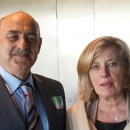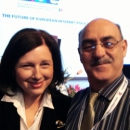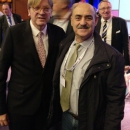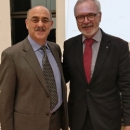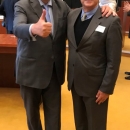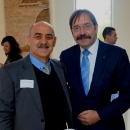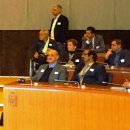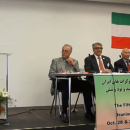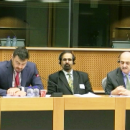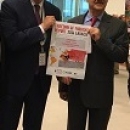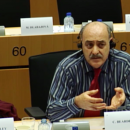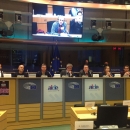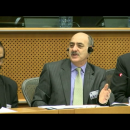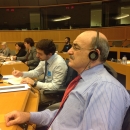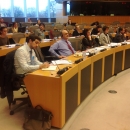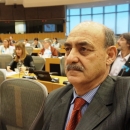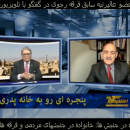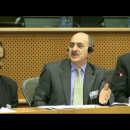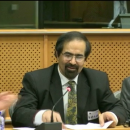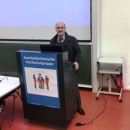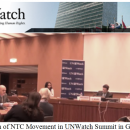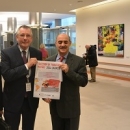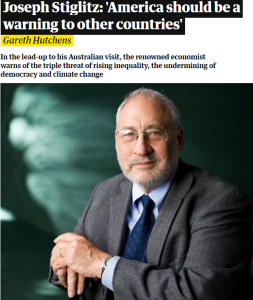The Guardian:
It’s a stark message from a Nobel-prize winning economist.
“We were a very different country 40 years ago,” he says. “The downhill slide has been pretty fast. America, I think, should be an important warning to other countries not to take for granted their institutions. I worry that things in the United States could get much worse.”
Joseph Stiglitz is coming to Australia next week. The renowned economist and Columbia University professor has been awarded the 2018 Sydney peace prize for leading one of the defining public policy discussions of our age – the crisis caused by economic inequality.
Stiglitz is credited with pioneering the concept of the “1 per cent”, the idea that the upper 1% of Americans have accumulated so much political power and wealth in recent decades – through voter suppression, gerrymandering, and the corrupting influence of money – that the country’s economy has suffered, and its democracy has been undermined.
In 2011, barely two years into Barack Obama’s first presidential term, he warned the political upheavals then roiling countries including Egypt, Tunisia, Libya, Yemen and Bahrain could one day be visited upon the US, but in an American way. Later that year, the Occupy Wall Street protest emerged in Manhattan’s financial district.
His 2012 bestselling book The Price of Inequality explained in detail how America had been growing apart, at an increasingly rapid rate. He argued forcefully that the severe inequality in the US was a choice of the country’s leaders: a consequence of their policies, laws and regulations.
This month he plotted in Scientific American how inequality had worsened so much over the last 40 years that US democracy was imperilled.
“Whereas the income share of the top 0.1% has more than quadrupled and that of the top 1% has almost doubled, that of the bottom 90% has declined,” he wrote.
“Wages at the bottom, adjusted for inflation, are about the same as they were some 60 years ago. Wealth is even less equally distributed, with just three Americans having as much as the bottom 50%.”
“As more of our citizens come to understand why the fruits of economic progress have been so unequally shared, there is a real danger that they will become open to a demagogue blaming the country’s problems on others and making false promises of rectifying ‘a rigged system’.
“We are already experiencing a foretaste of what might happen. It could get much worse.”
Stiglitz tells Guardian Australia, in the lead-up to his trip to Australia, that this country has a lot to learn from America.
“One of the reasons I wrote [The Price of Inequality] is almost as a warning to other countries,” he says.
“Some of the forces attacking what I would call the social order … those who are shortsighted and in the 1%, know that what they want is contrary to what would evolve in a functioning democracy.
“Most Americans want a higher minimum wage, they want gun control, they want access to healthcare, they want stronger financial regulation – the polling on some of these issues is, you know, 75% or more – and yet our democracy can’t deliver it.
“Those on the other side have to undermine democracy if they’re going to thwart the will of such a large majority, so they undermine it by disenfranchisement and disempowerment.”
Stiglitz says the vision of policymakers in the aftermath of the second world war was to draw together a community that had fought together, to help society become more equal. In the 1960s that was reinforced with demands for racial and social and gender justice, to break down further the forces that had long-divided society.
“It was a continuation if you looked at it in a grand historical [perspective] where we’d gotten rid of feudalism and hereditary privilege and we were moving step by step to a greater system of social justice,” he says. “That was our vision, with the civil rights movement.”
But the election of Donald Trump as president, and a Republican push to further undermine economic equality, mean the old social contract is being further undermined.
“Now we have Trump – a misogynist, a racist, a bigot – as president and openly espousing these things, and we have the majority of the Republican party voting for a tax bill that increases inequality and leads more people to have no insurance coverage. It’s further undermining the social contract and [the old] vision.”
Stiglitz says he plans to talk about all of these things in Australia, including the problem of climate change – which he says presents the strongest critique of the capitalist system.
“It reminds one of Jared Diamond’s story of collapse on Easter Island where they cut down the last tree and there they were, unable to paddle to any other island and they’d destroyed their future,” he says.
“We’re doing the same. The magnitude of the dysfunction is unbelievable. And what’s remarkable about it is, some of the work I’ve done has shown the cost to our society of dealing with this is minuscule, at most 2% of GDP, whereas the cost of not dealing with it could be horrendous.”
He says any view of a well-managed society would be “why not deal with the threat of climate change?”
“Particularly because the way you’d do it would actually stimulate the economy.”
Prof Joseph Stiglitz will be in Australia to receive the Sydney peace prize. He will be awarded the prize at the City of Sydney peace prize lecture on 15 November, and speak at the National Press Club in Canberra on 14 November and at the Athenaeum Theatre in Melbourne on 19 November


